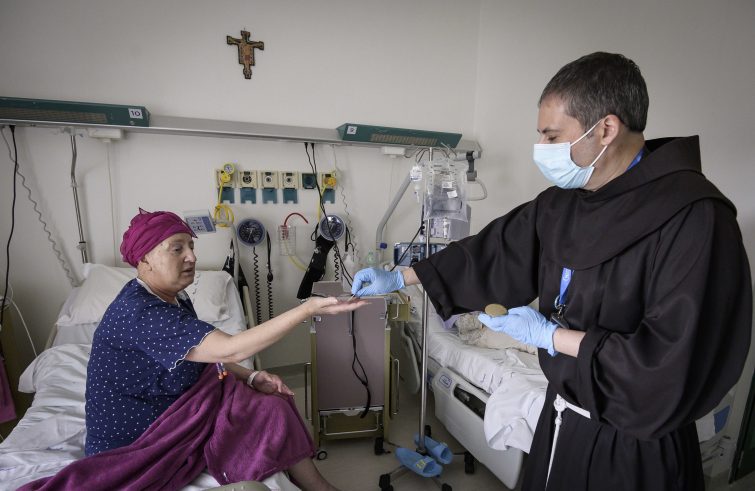
“The theme of the 30th World Day of the Sick, ‘Be merciful, as your Father is merciful’, makes us turn our gaze to God, model of mercy. The subheading, ‘Stand by those who suffer on a path of charity’, highlights this interpretative key and challenges us all, each in our own right”, said Massimo Angelelli, Director of the National Office for Pastoral Assistance to Healthcare of the Italian Bishops’ Conference (CEI), interviewed by SIR. In his view, a sick person needs “some fundamental gestures of closeness.” First and foremost, by offering personal closeness. “We cannot attend to the needs of a sick person and share their journey unless we are physically present. In his interview with Italian TV programme ‘Che tempo che fa’ on Sunday evening, Pope Francis referred to the sense of touch as one of the most comprehensive senses – pointed out the director of the CEI Office – The sick person needs human contact since being sick is an isolated condition. That is why our first approach in health care ministry is to be at their side. Not opposite the sick person, nor behind them, but at their side. Because we walk together.
The Christian community is called to offer closeness to those who suffer in a journey of charity.
Moreover, says Fr Angelelli, “the experience of the last two and a half years has shown us that health cannot be taken for granted. Before the pandemic, we were confident about our well-being, about our physical condition. Now the inherent fragility of this aspect – which must be protected – has come to the fore.”
 Three key players. The director of the Italian Episcopal Conference Office identifies three key players involved in the condition of sickness. Firstly, the sufferer, who “experiences this situation personally. He is at the heart of everything, and must be prevented from becoming an object of the treatment process.” At the same time, it is important to avoid fragmentation: “We must not treat a single disorder or a diseased organ per se, but the entire person. The aim is,
Three key players. The director of the Italian Episcopal Conference Office identifies three key players involved in the condition of sickness. Firstly, the sufferer, who “experiences this situation personally. He is at the heart of everything, and must be prevented from becoming an object of the treatment process.” At the same time, it is important to avoid fragmentation: “We must not treat a single disorder or a diseased organ per se, but the entire person. The aim is,
to recover if possible, to care for always.
Family members and friends share the suffering of the sick person, caring for them with small acts of love and kindness that are extremely precious, yet they feel powerless and frustrated because they can’t do more. They too”, Angelelli explains, “are the recipients of our supportive care in moments of fatigue. The third player is “the healthcare professional: physicians, nurses, social and healthcare workers. All those who, with great expertise, are taking care of the sick. Over the last few years they have been exposed to the pain and suffering of others more than ever. They too, the care givers, must be cared for in turn, so that they may live and work in conditions of serenity. In fact, we have dedicated two initiatives to them”, adds the director of the CEI Office.
A prayer and a thanksgiving letter. The first, on February 4, entitled “Instead a Samaritan”, consisted of a one-hour Eucharistic adoration live-streamed on YouTube from the chapels of the hospitals “Borgo Roma” in Verona, “Madre G. Vannini – Figlie di san Camillo” (Rome) and the University Hospital in Modena, as well as from the parish-shrine “Opera Santi Medici Cosma e Damiano” in Bitonto (Bari).
“For one hour,” explained the priest, “the hospital chaplaincies virtually came together in a prayer of thanksgiving to God for the gift of caring.”
On February 9, speaking on behalf of the Office he directs, Fr. Angelelli sent a letter to all health care workers: “I have known them, I have seen their untiring dedication to caring for the sick, we have spent years together, we are fond of one another, we have sustained each other during moments of difficulty, during endless nights. I carry them all in my heart.” “I have great admiration, gratefulness and affection for all healthcare workers,” he continues, “I have learned a lot from them and this letter is dedicated to them.” The document is not only an expression of gratitude. It also highlights a number of stumbling blocks and offers guidance for resolving them. “This is the key word: hope, which transforms our gaze. When two people meet – the care giver and the cared-for – it gives rise to true solicitude. Thus, for the priest,
“the patient becomes an instrument of fulfilment for the care giver- not only professionally but also in terms of humaneness and grace”.










